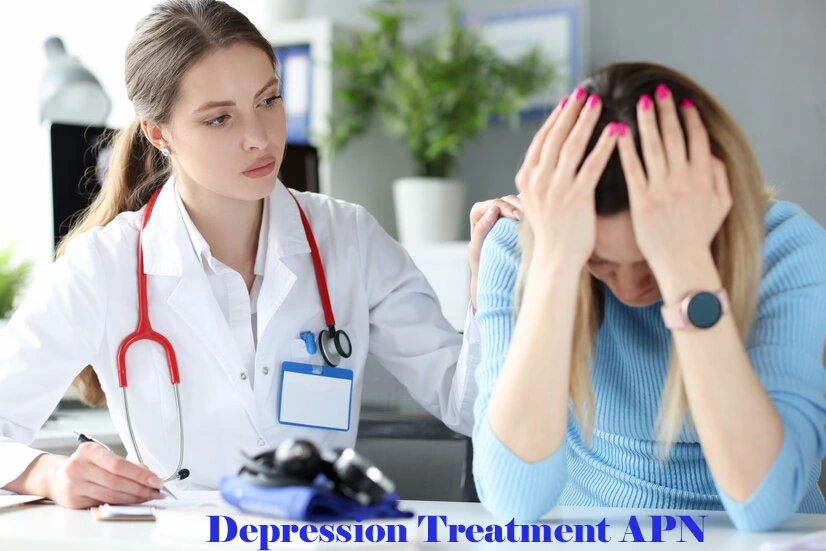Introduction Depression Treatment APN
Depression is a prevalent mental health condition that affects millions of people worldwide. It is characterized by persistent feelings of sadness, hopelessness, and a lack of interest or pleasure in daily activities. Effective treatment is crucial for managing depression and improving the quality of life for those affected. Advanced Practice Nurses (APNs) play a vital role in the treatment of depression, offering a range of services that include psychotherapy, medication management, and holistic care.
Understanding Depression
Symptoms and Diagnosis
Depression manifests in various ways, including emotional, cognitive, and physical symptoms. Common signs include persistent sadness, fatigue, difficulty concentrating, changes in sleep and appetite, and thoughts of self-harm or suicide. Diagnosis typically involves a comprehensive assessment by a healthcare professional, considering both the patient’s history and current symptoms.
Causes and Risk Factors
Depression can result from a combination of genetic, biological, environmental, and psychological factors. Risk factors include a family history of depression, significant life changes or trauma, chronic medical conditions, and substance abuse.
The Role of Advanced Practice Nurses in Mental Health
Who Are Advanced Practice Nurses?
Advanced Practice Nurses (APNs) are registered nurses with advanced education and clinical training. They hold a master’s or doctoral degree in nursing and are certified in specialized fields. APNs include Nurse Practitioners (NPs), Clinical Nurse Specialists (CNSs), Nurse Anesthetists, and Nurse Midwives.
APNs Specializing in Mental Health
APNs who specialize in mental health, often referred to as Psychiatric Mental Health Nurse Practitioners (PMHNPs), are trained to diagnose and treat mental health conditions, including depression. They provide comprehensive care that addresses both the psychological and physical aspects of mental health.
Types of Depression Treatment APN
Psychotherapy
APNs offer various forms of psychotherapy, helping patients explore their thoughts, feelings, and behaviors to develop healthier coping mechanisms.
Medication Management
APNs can prescribe and manage medications for depression, tailoring treatment plans to meet individual patient needs.
Lifestyle and Wellness Counseling
APNs emphasize holistic care, advising patients on lifestyle changes that can support mental health, such as diet, exercise, and sleep hygiene.
Psychotherapy Techniques Used
Cognitive Behavioral Therapy (CBT)
CBT is a widely used therapy that helps patients identify and change negative thought patterns and behaviors that contribute to depression.
Dialectical Behavior Therapy (DBT)
DBT combines cognitive-behavioral techniques with mindfulness practices, particularly useful for patients with severe depression and co-occurring conditions.
Interpersonal Therapy (IPT)
IPT focuses on improving interpersonal relationships and communication patterns that may contribute to a patient’s depressive symptoms.
Medication Management by APNs
Antidepressants
APNs can prescribe various types of antidepressants, including SSRIs, SNRIs, and tricyclics, depending on the patient’s specific needs and response to treatment.
Mood Stabilizers
For patients with mood disorders that include depressive episodes, APNs may prescribe mood stabilizers to help regulate mood swings.
Patient Monitoring and Adjustment
APNs regularly monitor patients’ progress, adjusting medications as necessary to minimize side effects and maximize therapeutic benefits.
Holistic and Integrative Approaches
Mindfulness and Meditation
APNs often incorporate mindfulness and meditation techniques into treatment plans to help patients manage stress and increase emotional resilience.
Nutrition and Exercise
Diet and physical activity play significant roles in mental health. APNs provide guidance on nutrition and exercise to support overall well-being.
Sleep Hygiene
Good sleep practices are essential for mental health. APNs educate patients on strategies to improve sleep quality and establish healthy sleep routines.
Advantages of Depression Treatment APN
Personalized Care
APNs are known for their patient-centered approach, providing personalized care that considers the individual’s unique circumstances and needs.
Accessibility and Availability
With a growing number of APNs specializing in mental health, access to depression treatment has improved, especially in underserved areas.
Comprehensive Approach
APNs offer a holistic approach to treatment, addressing both the mental and physical health aspects of depression, which can lead to more effective and sustainable outcomes.
Challenges Faced by APNs in Depression Treatment
Stigma and Misconceptions
Despite their expertise, APNs often face stigma and misconceptions about their role in mental health care. Educating the public about their qualifications and capabilities is crucial.
Insurance and Reimbursement Issues
Navigating insurance and reimbursement can be challenging, as policies and coverage for mental health services vary widely.
Scope of Practice Limitations
In some regions, APNs face limitations on their scope of practice, which can restrict their ability to provide comprehensive care. Advocacy for regulatory changes is ongoing.
Case Studies and Success Stories
Real-life Examples of APN-Led Treatments
Numerous case studies highlight the success of APN-led treatments in managing depression. These examples demonstrate the effectiveness of personalized care plans and the positive impact on patients’ lives.
Patient Testimonials
Patients often express gratitude for the compassionate and comprehensive care provided by APNs, emphasizing the difference it has made in their mental health journey.
Conclusion
Depression Treatment APN, offering a range of services that include psychotherapy, medication management, and holistic care. Their personalized approach, accessibility, and comprehensive care make them invaluable in the mental health field. As the demand for mental health services continues to grow, the role of APNs in treating depression is likely to expand, providing more individuals with the care they need to lead healthier, happier lives.
FAQs
1. What qualifications do APNs need to treat depression? APNs must have a master’s or doctoral degree in nursing, along with specialized training in mental health. They also need certification and licensure in their state or country.
2. How do APNs differ from psychiatrists and psychologists? APNs can provide both therapy and medication management, while psychiatrists primarily focus on medication and psychologists on therapy. APNs offer a blend of both approaches.
3. Can APNs prescribe medication for depression? Yes, APNs, especially Psychiatric Mental Health Nurse Practitioners (PMHNPs), can prescribe medications for depression and other mental health conditions.
4. What should I expect during my first visit with an APN for depression? During the first visit, the APN will conduct a thorough assessment, discuss your symptoms and history, and develop a personalized treatment plan that may include therapy, medication, and lifestyle changes.
5. How do I find an APN who specializes in mental health? You can find APNs specializing in mental health through online directories, healthcare provider networks, and referrals from your primary care physician or mental health organizations.












2 thoughts on “Depression Treatment APN: Exploring Advanced Practice Nursing”